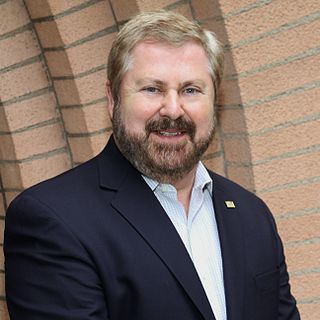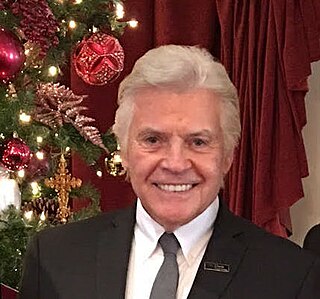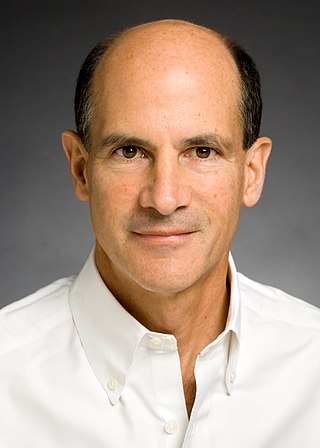
Gerontology is the study of the social, cultural, psychological, cognitive, and biological aspects of aging. The word was coined by Ilya Ilyich Mechnikov in 1903, from the Greek γέρων (gérōn), meaning "old man", and -λογία (-logía), meaning "study of". The field is distinguished from geriatrics, which is the branch of medicine that specializes in the treatment of existing disease in older adults. Gerontologists include researchers and practitioners in the fields of biology, nursing, medicine, criminology, dentistry, social work, physical and occupational therapy, psychology, psychiatry, sociology, economics, political science, architecture, geography, pharmacy, public health, housing, and anthropology.
Leonard Hayflick is a Professor of Anatomy at the UCSF School of Medicine, and was Professor of Medical Microbiology at Stanford University School of Medicine. He is a past president of the Gerontological Society of America and was a founding member of the council of the National Institute on Aging (NIA). The recipient of a number of research prizes and awards, including the 1991 Sandoz Prize for Gerontological Research, he has studied the aging process for more than fifty years. He is known for discovering that normal human cells divide for a limited number of times in vitro. This is known as the Hayflick limit. His discoveries overturned a 60-year old dogma that all cultured cells are immortal. Hayflick demonstrated that normal cells have a memory and can remember at what doubling level they have reached. He demonstrated that his normal human cell strains were free from contaminating viruses. His cell strain WI-38 soon replaced primary monkey kidney cells and became the substrate for the production of most of the world's human virus vaccines. Hayflick discovered that the etiological agent of primary atypical pneumonia was not a virus as previously believed. He was the first to cultivate the causative organism called a mycoplasma, the smallest free-living organism, which Hayflick isolated on a unique culture medium that bears his name. He named the organism Mycoplasma pneumoniae.
The USC Leonard Davis School of Gerontology is one of the seventeen academic divisions of the University of Southern California in Los Angeles, focusing on undergraduate and graduate programs in gerontology.
James E. Birren was one of the founders of the organized field of gerontology. He was a past president of The Gerontological Society of America, and author of over 250 publications.
Caleb Ellicott Finch is an American academic who is a professor at the USC Davis School of Gerontology. Finch's research focuses on aging in humans, with a specialization in cell biology and Alzheimer's disease.

Kelvin J. A. Davies is the James E. Birren Chair of Gerontology at the USC Davis School of Gerontology with a joint appointment in Dana and David Dornsife College of Letters, Arts and Sciences in biology. He is involved in researching free radical biology, oxidative stress, and aging; and was an early member of the study of protein oxidation, proteolysis, and altered gene expression during stress-adaptation; he also found the role of free radicals in mitochondrial adaptation to exercise, and demonstrated the role of diminished oxidative stress-adaptive gene expression in aging.
Valter D. Longo is an Italian-American biogerontologist and cell biologist known for his studies on the role of fasting and nutrient response genes on cellular protection aging and diseases and for proposing that longevity is regulated by similar genes and mechanisms in many eukaryotes. He is currently a professor at the USC Davis School of Gerontology with a joint appointment in the department of Biological Sciences as well as serving as the director of the USC Longevity Institute.
Ruth Leah Weg was an American academic who worked as a professor at the USC Davis School of Gerontology.
Teresa Thomas "Terry" Fulmer, is the current president of The John A. Hartford Foundation. Earlier positions include distinguished professor and dean of the Bouvé College of Health Sciences at Northeastern University and dean of the College of Nursing at New York University. She is known for her extensive research in geriatrics and elder abuse. She has received funding from the National Institute on Aging, the National Institute of Nursing Research and other foundations for her research regarding elder abuse.

Fernando Torres-Gil graduated from San Jose State University in 1970 with a BA in Political Science, PhD, was the first Assistant Secretary for Aging at the Administration on Aging within the U.S. Department of Health and Human Services. He was appointed by President Clinton in 1993 and served in the position until 1997. Currently, Torres-Gil sits on the National Council on Disability as an appointee of President Obama. He is the Associate Dean of Academic Affairs and Professor of Social Welfare and Public Policy at the UCLA Luskin School of Public Affairs. He is the Director of the UCLA Center for Policy Research on Aging and is a member of the AARP Board of Directors. Torres-Gil also holds the position of Adjunct Professor of Gerontology at the USC Davis School of Gerontology, having served as Professor of Gerontology and Public Administration at USC before moving to UCLA. In December 2022, Torres-Gil as a fellow by the American Academy of Social Work and Social Welfare for 2023.
Pinchas Cohen is the dean of the USC Leonard Davis School of Gerontology, holds the William and Sylvia Kugel Dean's Chair in Gerontology and serves as the executive director of the Ethel Percy Andrus Gerontology Center.
The Estonian Association of Gerontology and Geriatrics (EGGA) is an association of Estonian professionals who work with the elderly, established in 1997.
Henry Jay Forman is both Distinguished Professor Emeritus of Biochemistry at the University of California, Merced. and Research Professor Emeritus of Gerontology at the USC Leonard Davis School of Gerontology. He is a specialist in free radical biology and chemistry, antioxidant defense, and pioneered work in redox signaling including the mechanisms of induced resistance to oxidative stress.

Marie A. Bernard, M.D. is the Chief Officer for Scientific Workforce Diversity at the National Institutes of Health (NIH). Prior to this, she was the deputy director of the National Institute on Aging at the NIH, where she oversaw approximately $3.1 billion in research focused on aging and Alzheimer's disease. Bernard co-leads the NIH UNITE initiative, launched in 2021 to end structural racism in biomedicine. She co-chairs the Inclusion Governance Committee, which promotes inclusion in clinical research by sex/gender, race/ethnicity, and age. She also co-chairs two of the Department of Health and Human Services Healthy People 2020 objectives: 1) Older Adults, and 2) Dementias, including Alzheimer's disease. Prior to arriving at NIH in 2008, Bernard served as Donald W. Reynolds Chair in Geriatric Medicine and founding chairperson of the Donald W. Reynolds Department of Geriatric Medicine at the University of Oklahoma College of Medicine, and Associate Chief of Staff for Geriatrics and Extended Care at the Oklahoma City Veterans Affairs Medical Center.

Giulio Maria Pasinetti is the Program Director of the Center on Molecular Integrative Neuroresilience and is the Saunders Family Chair in Neurology at the Icahn School of Medicine at Mount Sinai (ISMMS) in New York City. Pasinetti is a Professor of Neurology, Psychiatry, Neuroscience, and Geriatrics and Palliative Medicine at ISMMS.

George Shannon is an American professor of gerontology at the USC Leonard Davis School of Gerontology, inaugural holder of the Kevin Xu Chair in Gerontology, and director of the Rongxiang Xu Regenerative Life Science Laboratory. He is also a former television and film actor, particularly known for his appearances in soap operas, including How to Survive a Marriage, Search for Tomorrow, Generations, and General Hospital. He played a leading role in the 1973 French surreal drama film I Will Walk Like a Crazy Horse.

Victor A. RegnierFAIA is an American architect, professor, and researcher. His research and publications have explored the creation and evaluation of residential settings for the physically and cognitively frail with special attention to northern European precedents.
Elaine Marjorie Brody was an American gerontologist and sociologist, who studied cases on elderly Americans tended to by caregivers. In a career lasting six decades, she was one of the first social workers to research her clients, particularly of "women in the middle", a term she used to refer to women who raised their children and cared for their elderly parents simultaneously. Brody contributed to the foundation of gerontology, and her works established a precedent in this field.
Sandra F. Simmons is an American clinical psychologist and gerontologist. She is the Joe C. Davis Endowed Chair in Biomedical Science at Vanderbilt University and the director of the Vanderbilt Center for Quality Aging.

Thomas A. Rando is an American stem cell biologist and neurologist, best known for his research on basic mechanisms of stem cell biology and the biology of aging. He is the Director of the Eli and Edythe Broad Center of Regenerative Medicine and Stem Cell Research and a professor of Neurology and Molecular, Cell and Developmental Biology at the University of California, Los Angeles. Prior to joining the UCLA faculty, he served as Professor of Neurology and Neurological Sciences at Stanford University School of Medicine, where he was also founding director of the Glenn Center for the Biology of Aging. His additional roles while at Stanford included co-founder and deputy director of the Stanford Center on Longevity, founding director of Stanford's Muscular Dystrophy Association Clinic, and Chief of Neurology at the VA Palo Alto Health Care System.







